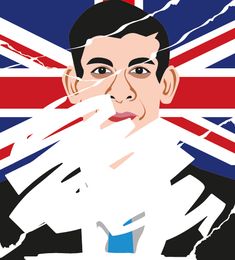The British are polarised on taxes, welfare, politics and the Israel-Gaza war. But they agree Prime Minister Rishi Sunak’s Conservative Party will be mauled in the May 2 local elections in England and Wales. Opinion polls give the opposition Labour party a 20-point lead over the Tories. An election debacle could tempt Sunak’s opponents within the party to topple him. Or he could limp along, wounded and weak, only to crash-land in the looming general elections. That would bring back Labour.
An invigorated Labour party is ahead in the thousands of seats in the upcoming local councils and mayoral races, including London. In traditional Tory strongholds of West Midlands and Tees Valley in England, conservative candidates shun Sunak in their leaflets and request toxic Tory MPs to stay away. Tories could also lose their Blackpool South parliamentary seat, vacated by Tory MP Scott Benton after a lobbying scandal.
Experts agree the problem is the Tory party. Its legacy after a 14-year rule—some say misrule—is public fatigue. Brexit was a folly characterised by drama, deceit and disruption.
Tory obsession with low taxes weakened public finances, hurting infrastructure, leaving health services dysfunctional, schools crumbling and roads potholed. “All symbols of a nation in decline,” say Labour leaders. While citizens endured economic hardship, Tory ministers and parliamentarians swirled through scandals, sleaze and swinging parties during Covid lockdowns. Famous for reinventing themselves to stay in power, Tories have now run out of steam, options, ideas and public patience.
In 2022, Sunak began well as PM by capitalising on his popularity as chancellor (finance minister) during Covid when he distributed £200 billion in public benefits. He was young, clever, competent and cosmopolitan. He became “Mr Brexit Fix-it”, clinching agreements to mend fences on Northern Ireland, trade and repairing relations with the European Union.
But he epitomises the cautionary tale about rising too far too fast. Politically inexperienced, his attempts to relate to ordinary folks seemed grating, gauche and glib. He claimed he ate “wraps” at McDonalds—when wraps were discontinued years before; was a “coke addict” (meaning Coca Cola). He gallingly stole credit from the Bank of England for falling inflation and from bad weather for the reduced illegal migrant boat crossings; a technocratic, tactless “fiscal hawk” who asked a homeless person, “Do you work in business?” In winter, high energy costs left voters shivering in their unheated homes. But media reported that North Yorkshire’s electricity grid was upgraded because Richie Rich Sunak’s swimming pool consumed so much electricity. There is no penalty in politics for being rich, but there is a price for appearing out of touch.
But Sunak’s problem is less with voters than with partymen loyal to his foe and proven vote-getter, former PM Boris Johnson.
Even if he survives these threats, Sunak will be maimed and his party in meltdown-mode with the infighting. This harms Tory prospects in the general elections. Already, Sunak’s lustre has dimmed, his ratings have plummeted—though its better than his predecessor Liz Truss’ minus 70 per cent. He looks like just another Tory in a social media operation.
Sunak’s advisors say he prefers to hold general elections in autumn so voters have time to see the economic benefits of his policies—and the US election chaos. But analysts say Sunak may call for snap general elections in June to avoid a humiliating leadership challenge.
To borrow 19th century British statesman Benjamin Disraeli’s quip against his political opponent William Gladstone’s administration, it is the Sunak government’s turn to look like “a range of exhausted volcanoes”.
Pratap is an author and journalist.


